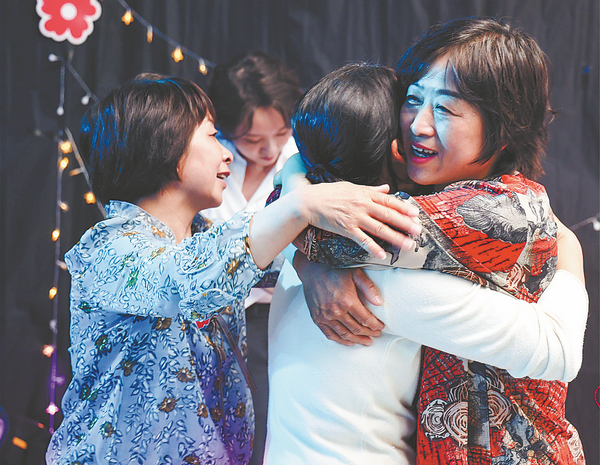

Other guests included an 82-year-old woman who helps her husband fight the creeping symptoms of Alzheimer's disease with dance, and a young woman with cerebral palsy who launched a nonprofit organization to help other women in her position.
The event attracted thousands of online viewers, with some of them commenting that the most impressive part was the performance by the amateur dancers and their stories.
The dance, titled Fen Shen (Multiple Roles), has brought together almost 100 female domestic workers from the Beijing Hongyan Social Work Service Center, a public welfare institution that aims to assist domestic workers to enhance their cultural and job-related skills. The participants dedicated their only day off each week, over the course of 36 weeks, to rehearse for the performance.
Niu Huiling, one of the two dancers, is a former rural schoolteacher from Linfen in Central China's Shanxi province. After working in education for 27 years, she had to leave her hometown and seek better-paying work in Beijing due to financial stresses caused by her husband's illness.
"My son had just got married, and we had built a new house in the village. But then my husband fell ill, and we incurred a large amount of debt. My daughter bought me a train ticket to Beijing, so for the first time in my life, I embarked on a new journey alone," she recalls.
It was winter in 2019, about two months before millions of Chinese returned to their hometowns to celebrate Spring Festival, which is the most important family reunion of the year.
However, Niu did not have any excitement for celebrating the upcoming Lunar New Year. Instead, she dragged her tired body from one recruitment agency to another, with the aim of landing a job as a domestic worker as soon as possible, so that she could accumulate the necessary 10,000 yuan ($1,410) within two months.
On the eve of Spring Festival, Niu achieved her goal of earning the targeted income. The success encouraged her to return to Beijing one year later as she still faced financial problems. However, due to the COVID-19 pandemic, there were fewer opportunities for domestic work, so she had to take an unstable job selling food packed in paper boxes to labor workers on a construction site.
"I had been working for three to four months when I received a call from home informing me that my husband's condition had deteriorated. When I returned home, he had already been sent to the intensive care unit. We spent the last 100 days of his life in the hospital," recalls Niu.